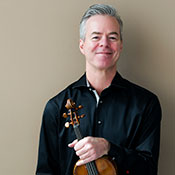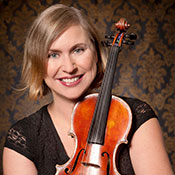
Violinist Yuka Kadota Finds Joy in Teamwork
David Lewellen
PUBLISHED
Tagged Under: MSO Musicians, Violin
Yuka Kadota was a good violinist as a teenager, but she kept playing only because “my mother made me,” she says honestly.
But parental pressure doesn’t get anyone into the first violin section of the Milwaukee Symphony, where Kadota has performed since 2013. When did music stop being a chore?
“Any day now,” she says with a laugh. “Actually, my mom said I couldn’t quit until I was 18. And I was 17 and a half.” That was when, as a freshman at Indiana University, playing in an orchestra for the first time ever, she performed Dvořák’s Carnival Overture, “and I thought, where has this been all my life? That was when I started being a violinist and a musician.”
Her violin teacher in her teens had emphasized solo work and conveyed the attitude that “if you play in an orchestra, you’ve failed.” But when she had her epiphany at Indiana, “I was really behind and had a lot of catching up to do, so I put my head down and practiced like crazy.” Passionate about it for the first time, “I had to re-learn how to play. My teacher rebuilt my bow arm and my sound concept – he told me I needed a sound concept, first of all. That’s literally your musical fingerprint. It informs everything from how you physically produce sound on your instrument to the musical choices that are uniquely yours. ”
After graduation, she spent two years studying with that same teacher, Henryk Kowalski, in Sweden, going to every concert in Stockholm that she could and gaining experience in taking auditions. Upon returning to the United States, she was accepted into the Chicago Civic Orchestra, and continued her listening education by attending the Chicago Symphony.
She won a job with the Fort Wayne Philharmonic in 2001, but in 2007 she began substituting with the Chicago Symphony, a relationship that she still maintains. Her first performance, of the Brahms German Requiem, “was like a dream,” she says. “I couldn’t believe I was there. It was the best orchestra I had ever played in, and it was incredibly intense and magical, that I was part of that sound.”
It was on a tour of California with the Chicago Symphony that she got to know her husband, percussionist Ryan Kalbaugh, who was also a substitute musician. Because the luggage was sorted alphabetically, they would always see each other as they got their suitcases, and conversation followed. The couple were married last year and live in Shorewood. They have a 10-month-old daughter, Miya, whom they hope to raise as bilingual. Born in Queens to Japanese parents, to whom “music was like another subject that you study in school,” Kadota remembers going to preschool and not understanding the children who were speaking English.
Many orchestra violinists need some other musical outlet where they can be individuals and not blend in. But Kadota says, “I love it. I know some people feel stifled, but I find it challenging to see if I can give the conductor what he is asking for but somehow also add my own personality. Sometimes to amuse myself I’ll say ‘What about this?’ or try something and see if it gets a reaction, if there’s anything I can add to make the product better.”
“I’d much rather have people in the section with Yuka’s attitude than the ones who are just cogs in the wheel,” says concertmaster Frank Almond. Under new music director Ken-David Masur, “I get the sense that he’s going to let us control things a bit more. And that generally comes from the front stand, but it can come from within the section as well.” He knew Kadota before she won the Milwaukee audition, and “she has fit in very well, artistically and culturally. She has a great attitude and she’s easy to work with.”
“There’s very narrow leeway,” Kadota says, “but there is leeway. Being a soloist is nice, but I like being part of a team. And the repertoire is so rich, you can never get bored.”
That being said, she does have some outside outlets; she and three other MSO musicians (Paul Hauer, Beth Breslin, and Peter Szczepanek) do two concerts a year as the Prospect Quartet, and she recently soloed with the Milwaukee Youth Symphony Orchestra, where she regularly coaches young string players. She loves the coaching work “because of how much orchestra I didn’t have in my early years. I’m vicariously getting what I didn’t have.”



